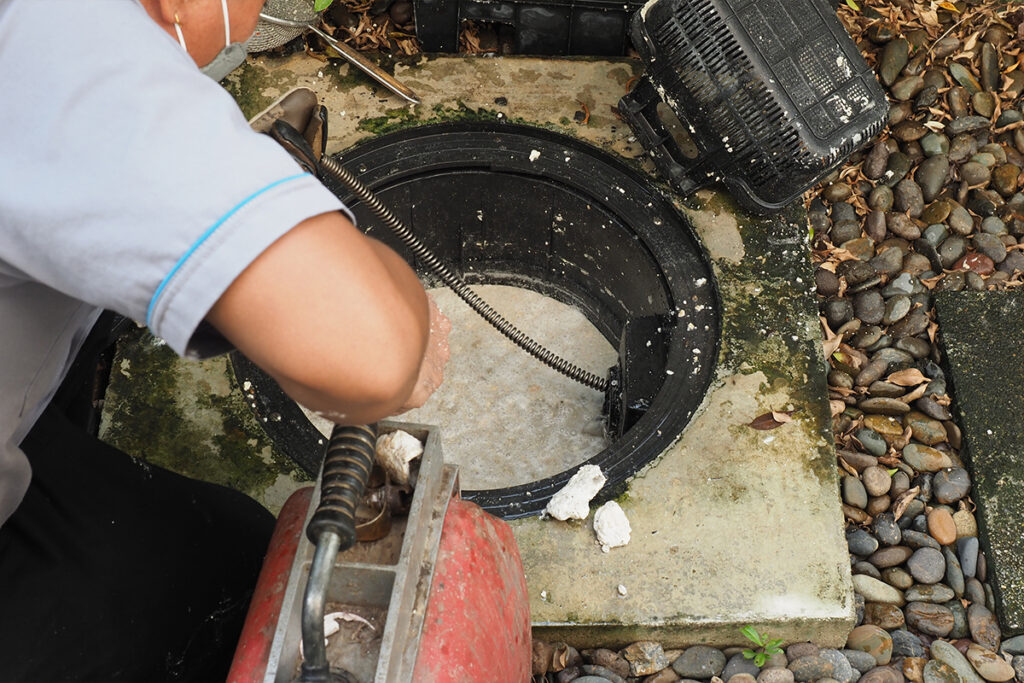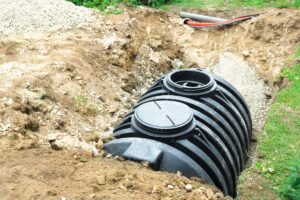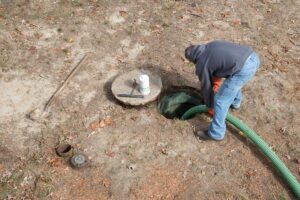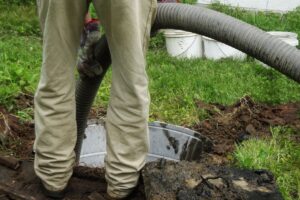Unpleasant odors are a constant battle for any establishment that prepares or serves food. While strong exhaust fans and air fresheners can temporarily mask these smells, they don’t address the root cause. In kitchens, grease traps play a crucial role in preventing odors by intercepting fats, oils, and grease (FOG) that would otherwise clog pipes and enter the sewage system. But even grease traps need regular maintenance to function effectively.
In this blog post, we’ll explore the connection between grease trap pumping and odor control, providing valuable insights for businesses in Eugene, Salem, Florence, and surrounding areas that prioritize a fresh and inviting environment.
What is grease trap pumping?
A grease trap is a plumbing device typically located underground that intercepts FOGs before they enter the sewer system. As wastewater flows through the trap, grease, oil, and food solids rise to the surface due to their lower density than water. These materials are collected in the trap, preventing them from solidifying and causing blockages further down the line. However, grease traps accumulate FOG over time, reducing their efficiency and leading to potential problems.
How do you get rid of a foul smell in a grease trap?
According to the leading grease trap pumping experts in Eugene, if you notice a foul odor from your kitchen drains, it strongly indicates that your grease trap needs pumping. The accumulated FOG in the trap can start to decompose, releasing unpleasant odors and attracting pests.
Here’s what you can do to eliminate the stench:
Schedule regular grease trap pumping:
The recommended frequency for grease trap pumping depends on the volume and type of food processing in your establishment. Top grease trap interceptor contractors in Salem reveal that restaurants with high-volume operations may require pumping every week or two, while lower-volume establishments might need it once a month or even every quarter. By establishing a regular pumping schedule with a credible company like Best Septic Tank Pumping, you can prevent unpleasant odors and ensure your grease trap functions optimally.
Maintain proper cleaning habits:
In addition to pumping, it’s essential to develop a routine for cleaning your grease trap. This involves removing any food solids that have accumulated on the surface and wiping down the interior of the trap. Leading grease trap contractors in Florence reveal that you can also use a degreaser to help break down any residual FOG.
What Strategies Can I Use to Identify and Avoid Odor Sources in Grease Traps?
A foul odor emanating from your kitchen drains clearly indicates something’s amiss with your grease trap. However, some other subtle signs can help you identify potential problems before the stench becomes overwhelming.
Here’s what to watch out for:
1. Plumbing Performance Issues:
- Slow Drains:
This is a common symptom of a grease trap nearing capacity. FOG buildup within the trap can restrict wastewater flow, slowing drainage in your kitchen sinks and floor drains. Pay attention to sluggish drainage, especially if it’s a recurring issue.
- Frequent Backups:
According to the leading grease trap pumping experts in Salem, if you’re experiencing sewage backups in your kitchen, it’s a strong signal that your grease trap is full and needs immediate attention. Backups not only create a sanitation hazard but can also damage your plumbing system.
2. Visual Inspection:
- Grease Trap Access:
Most grease traps have a removable lid that allows for visual inspection. If you’re comfortable doing so, carefully remove the lid and peek inside. Top grease trap pumping experts in Florence reveal that it’s best to look for a thick layer of grease, oil, and food solids floating on the surface of the wastewater. This indicates that your trap is nearing capacity and needs pumping.
- Grease Buildup Around the Trap:
Even if you can’t access the inside of your grease trap, look for grease buildup around the exterior of the unit. This can be a sign that FOG is overflowing the trap or that the system is leaking.
3. Unusual Sounds:
According to the top grease trap pumping specialists in Salem, gurgling noises emanating from your drains can be a sign of trapped air caused by a blockage within the plumbing system. While not always indicative of a grease trap issue, it’s worth noting, especially if accompanied by slow drainage.
Additional Tips:
- Schedule Regular Maintenance:
Don’t wait for odors or other problems to arise before addressing your grease trap. Establish a regular grease trap pumping schedule based on your establishment’s volume and type of food processing. Consulting with a licensed grease trap pumping service provider like Best Septic Tank Pumping can help you determine the optimal pumping frequency for your specific needs. Reach out to us at (541)236-5342 for an accurate estimate.
- Maintain Grease Trap Records:
Keeping a record of your grease trap pumping history can help you identify patterns or trends. This information can also be valuable for regulatory compliance purposes.
By being proactive and employing these strategies, you can effectively identify potential odor sources in your grease trap and ensure timely maintenance to maintain a fresh and odor-free kitchen environment.
WE ARE READY 24 HOURS TO HELP YOU.
How Grease Trap Pumping Contributes to Smell-Free Environments
Regular grease trap pumping plays a multifaceted role in maintaining a fresh and odor-free kitchen environment. Let’s delve deeper into the specific benefits:
Elimination of Odors at the Source:
Grease traps are designed to intercept FOG before they enter the wastewater system. However, as these materials accumulate over time, they begin to decompose. This decomposition process is fueled by bacteria that release unpleasant odors like butyric acid (think rancid butter) and mercaptans (associated with rotten vegetables and sewage). Regular pumping removes this built-up FOG, effectively eliminating the source of these foul odors.
Improved Air Quality and Customer Experience:
The unpleasant odors from a neglected grease trap can permeate the kitchen and surrounding areas. This creates an unpleasant work environment for your employees and can also negatively impact the customer experience.
Regular grease trap pumping by a credible provider like Best Septic Tank Pumping ensures a fresh and inviting atmosphere by preventing odor buildup, fostering a more positive dining experience for your patrons. Contact us at (541)236-5342 to schedule an appointment with our team today.
Enhanced Hygiene and Pest Control:
The decomposition of FOG within a grease trap can attract pests like flies and rodents. These pests not only pose a health risk but can also contribute to the spread of bacteria. Regular pumping removes the food source for these pests, minimizing their presence and promoting a more hygienic kitchen environment.
Reduced Risk of Blockages and Backups:
When FOG isn’t properly contained and removed, it can solidify and accumulate within the grease trap and further down the plumbing system. This can lead to blockages and even sewage backups, causing disruptions to your operations and potentially requiring costly repairs. Regular grease trap pumping prevents FOG buildup, ensuring smooth operation of your plumbing system.
Environmental Benefits:
Beyond the immediate benefits of your establishment, proper grease trap maintenance contributes to a healthier environment. When FOG enters the sewer system, it can disrupt wastewater treatment processes and ultimately harm aquatic life. Leading grease trap pumping contractors in Eugene reveal that routine maintenance helps minimize these environmental impacts by removing FOG before it reaches the sewer system.
Final Takeaway
In conclusion, grease trap pumping is more than routine maintenance. It’s critical to maintain a clean, odor-free, and hygienic kitchen environment. The benefits extend beyond your establishment, contributing to a more pleasant customer experience, improved employee morale, and a healthier environment.
At Best Septic Tank Pumping, we understand the critical role that regular grease trap pumping plays in maintaining a smooth and odor-free operation. Our team of experienced professionals is committed to providing comprehensive grease trap pumping services tailored to your establishment’s unique needs.
As a family-owned business deeply rooted in the communities of Eugene, Salem, Florence, and beyond, we take pride in serving our fellow local businesses with personalized care and attention to detail. We’re not just your service provider; we’re your partners in maintaining a fresh and inviting atmosphere that keeps customers coming back for more.
Don’t let foul odors tarnish your reputation or compromise the success of your establishment. Trust the local experts at Best Septic Tank Pumping to keep your kitchen fresh, clean, and welcoming so you can focus on what you do best—delighting your customers with exceptional food and service.
Contact us at (541) 236-5342 to book your appointment and learn more about how we can help elevate your kitchen environment.








